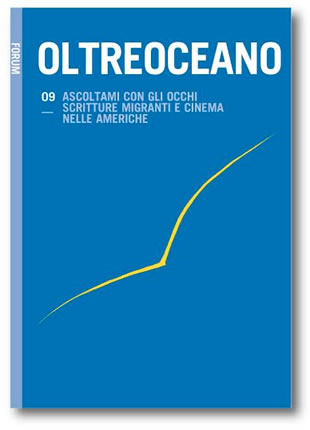Las migraciones de Cabrera Infante: de Cuba a Inglaterra, del cine a la literatura
Keywords:
Cabrera Infante, cine, literatura migranteAbstract
La literatura de Cabrera Infante es por definición migrante puesto que su trayectoria artística se desarrolla entre Cuba y Europa. A lo largo de toda su vida el autor cultiva una constante y entusiasmada pasión por el cine que se encuentra reflejada en las distintas etapas de su producción. En su caso la migración no es solo una condición existencial sino también una necesidad estética, ya que sus deseos de experimentar con la lengua y la literatura lo llevan a una continua migración de formas y contenidos narrativos de un sistema artístico a otro.
Cabrera Infante’s Migrations: from Cuba to England, from Cinema to Literature
Migration is a central element in Cabrera Infante’s literature. Actually his artistic production is realized between Cuba and Europe. During his life the author cultivates an incessant and enthusiastic passion for cinema which appears in different moments of his production. In his case migration it’s not only an existential condition but also an esthetic necessity. His experiments with language and literature let him to operate a migration of forms and contents from an artistic system to the other one.
Le migrazioni di Cabrera Infante: da Cuba all’Inghilterra, dal cinema alla letteratura
La scrittura di Cabrera Infante è migrante per definizione. La sua traiettoria artistica si articola tra Cuba e l’Europa. Durante tutta la vita, l’autore coltiva una costante ed entusiasmata passione per il cinema che si riflette nelle distinte tappe della sua produzione. Nel suo caso la migrazione non è solo una condizione esistenziale, ma anche e soprattutto una necessità estetica che nasce dal desiderio di sperimentare con la lingua e la letteratura, e che lo porta a operare una continua migrazione di forme e contenuti da un sistema artistico all’altro.
Downloads
References
Cabrera Infante, G. (1987): Arcadia todas las noches. Bogotá: La oveja negra.
Cabrera Infante, G. (1993): Un oficio del siglo XX, 1963. Madrid: El País & Aguilar.
Cabrera Infante, G. (1998): Cine o Sardina. Madrid: Alfaguara.
Cabrera Infante, G. (2000): La Habana para un infante difunto, 1979. Barcelona: Seix Barral.
Cabrera Infante, G. (2008): Tres tristes tigres, 1967. Nueva York: Rayo HarperCollins Publishers.
Cabrera Infante, G. & Alvarez-Borland, I. (1982): Viaje verbal a la Habana, ¡Ah Vana! Entrevista de Isabel Alvarez-Borland con G. Cabrera Infante, Arquitecto de una Ciudad de Palabras Erigida en el Tiempo. Hispámerica, 31, pp. 51-68.
Cabrera Infante, G. & Brookesmith, J. (1969): Entrevista. Cabrera Infante. Cantando las 40. Imagen, 42, pp. 9-16.
Cabrera Infante, G. & Martínez, T. E. (1968): América, los novelistas exiliados. Primera Plana, 292, pp. 48-50.
Cabrera Infante, G. & Nieto, J. (1973): Cabrera Infante habla de su obra. Razón y fábula, 33-34, pp. 64-83.
Costa, A. (1993): Immagine di un’immagine: cinema e letteratura. Turín: Utet.
Figueras, M. & Previtera, R. (2014): Entrevista. Les Ateliers du SAL, 4, en prensa.
Hall, K. (1989): Guillermo Cabrera Infante and the Cinema. Newark, DE: Juan de la Cuesta.
Mitchell, Ph. (1977): The Reel Against the Real. Cinema in the Novels of Guillermo Cabrera Infante and Manuel Puig. Latin American Literary Review, 6, pp. 22-29.
Downloads
Published
How to Cite
Issue
Section
License

This work is licensed under a Creative Commons Attribution-NonCommercial-ShareAlike 4.0 International License.
The authors undertake to comply with the following conditions, which are considered accepted at the time of submission of their contributions.
The sending of a text implies that it is unpublished and not submitted to be published elsewhere.
1. If accepted, the author shall confer on the publisher the right to publish and distribute it both in paper form and in the online electronic edition. The published articles will be downloadable and made available in open access.
2. Provided that it correctly indicates that the first publication took place in the journal Oltreoceano. Rivista sulle migrazioni the author has the right to: a) reproduce the article in separate extracts or collected in a volume; b) publish the article on their personal website or teaching site provided that these sites are of a non-commercial nature; c) deposit the article in online archives of a non-commercial nature, linked to the institution they belong to or as part of projects for the non-commercial dissemination and open access of scientific works.
The use of contributions by third parties, for commercial or otherwise unauthorized purposes, is not allowed. The publisher declines all responsibility for the unauthorized use of the material published in the journal.












